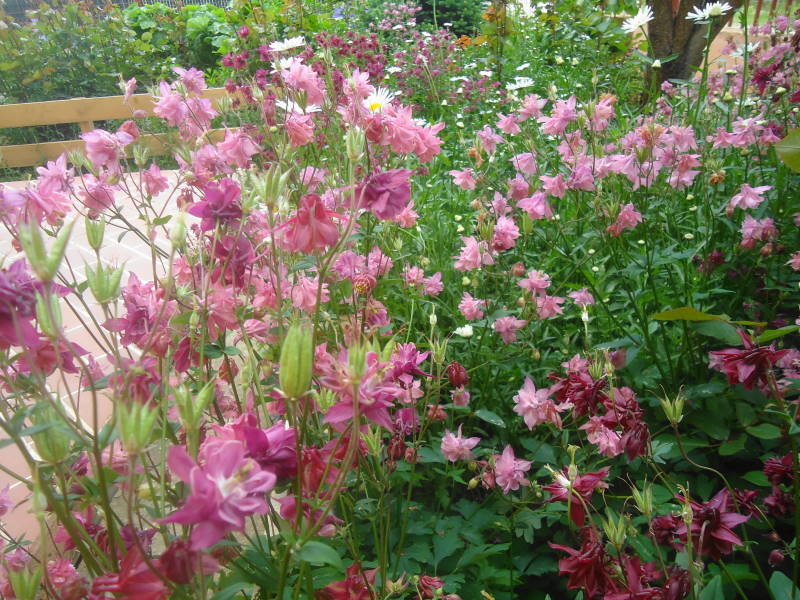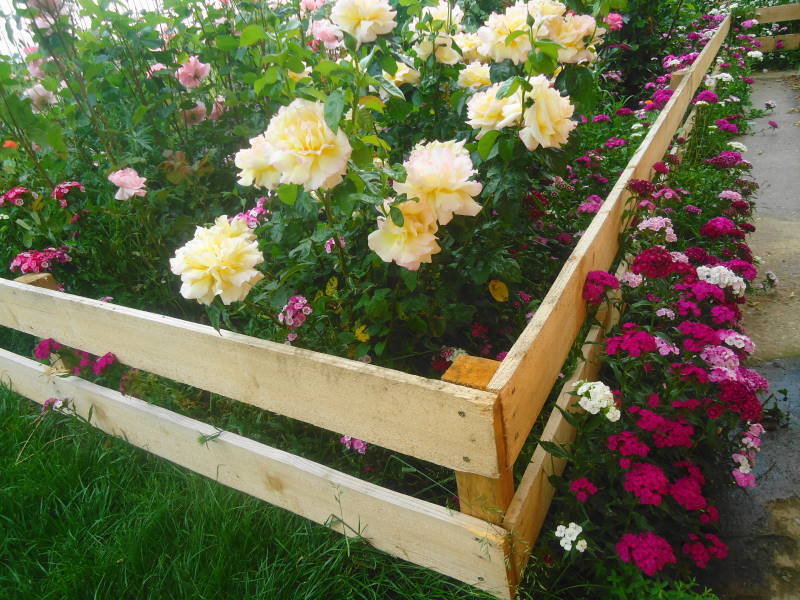





I love my plants and I wouldn't want them to die suddenly, for some mysterious reason. Yet, this happens all the time, even to the best of gardeners. Some might say it was someone's evil eye, but I say it was just a black thumb gardener.
In many cultures, the "evil eye" is known from old times, as a curse or spell on people, plants or animals by envious persons, just by gazing at them - that's where the "evil eye" expression comes from. The same expression is used in most countries, in their specific language, which means--more or less--the same thing: looking at someone with envy, thus transmitting a bad energy that can cause the person, child, animal or plant distress. In Turkey, Spain, Latin America and in Greece people use talismen or amulets as protection against the evil eye, such as a blue and white evil eye drawn on a metal disk (usually gold) or on glass beads.[1] Newborns and small children are believed to be especially protected from the evil eye with these amulets, tied up with a small red ribbon and pinned on the baby's clothes, crib or stroller. In Romania, we have the custom of tying a red ribbon or thread on the baby's wrist, or sewing a big red ribbon on his hat, in order to prevent the effect of an evil eye on the baby. This belief is so strong that, no matter how young and modern we are, or whether we believe it or not, the fear of a sick baby is enough to make us use the amulet on them, to protect them from the evil eye. But to think that a plant could be killed by an envious look? I could be tempted to believe that, if it weren't for many other things that could cause it.
ribbon and pinned on the baby's clothes, crib or stroller. In Romania, we have the custom of tying a red ribbon or thread on the baby's wrist, or sewing a big red ribbon on his hat, in order to prevent the effect of an evil eye on the baby. This belief is so strong that, no matter how young and modern we are, or whether we believe it or not, the fear of a sick baby is enough to make us use the amulet on them, to protect them from the evil eye. But to think that a plant could be killed by an envious look? I could be tempted to believe that, if it weren't for many other things that could cause it.It's hard to believe for us as modern people, that an evil look coming from an envious person could damage and even kill a plant, but some sure believe it, or they choose to believe it, rather than admit that they were careless, or just have a black thumb. It's true that we, gardeners, treat our plants as if they were our children. We want the best for them and care for them, even when we give them away. I am one of those gardeners, but I've never accused anyone for a plant's death, because they might have looked at it with an evil eye - that would be silly, wouldn't it? I lose a few of my plants every year, whether they are outside in the garden or in pots, whether it's summer or winter, whether it was my fault or not. If they were gloxinias, Saintpaulias, impatiens, cactuses or begonias, I may have overwatered them during fall or spring longer periods of rainy, humid days, causing rotted roots. Or, as happened last summer, in a very hot day, to a small poinsettia growing in a small pot, which dried out and died in 24 hours. I didn't have time to water that evening and watered it the next morning - for that poinsettia was too late. Nevertheless, I still have lots of plants by dividing them regularly, as insurance against such unpleasant events. In the garden, my plants grow more and more every summer, reseeding and multiplying themselves through their roots and runners, even as I give away lots of plants every year. In fact, it's good for them to be thinned from once in a while, not to mention how happy I am to share my plants. People walking on our street admire my plants and some of them ask me to give them some they liked best. But not one of my plants died afterwards, on the contrary!
were gloxinias, Saintpaulias, impatiens, cactuses or begonias, I may have overwatered them during fall or spring longer periods of rainy, humid days, causing rotted roots. Or, as happened last summer, in a very hot day, to a small poinsettia growing in a small pot, which dried out and died in 24 hours. I didn't have time to water that evening and watered it the next morning - for that poinsettia was too late. Nevertheless, I still have lots of plants by dividing them regularly, as insurance against such unpleasant events. In the garden, my plants grow more and more every summer, reseeding and multiplying themselves through their roots and runners, even as I give away lots of plants every year. In fact, it's good for them to be thinned from once in a while, not to mention how happy I am to share my plants. People walking on our street admire my plants and some of them ask me to give them some they liked best. But not one of my plants died afterwards, on the contrary!
Some of my friends or colleagues from work had bad experiences with the plants I gave them, which died during winter. But those were accidents, or neglect on their part, because I always give away plants with all my love. My Sweet Williams are especially very much admired by all and every spring I give away lots of them. Two of my colleagues lost theirs because of some unexpected digging in their garden, for plugging some pipes in the ground. My gloxinia and Saintpaulias are also much appreciated, but one of my friends keeps losing them because she overwaters them. Is there any evil eye involved in this? I don't think so!
are especially very much admired by all and every spring I give away lots of them. Two of my colleagues lost theirs because of some unexpected digging in their garden, for plugging some pipes in the ground. My gloxinia and Saintpaulias are also much appreciated, but one of my friends keeps losing them because she overwaters them. Is there any evil eye involved in this? I don't think so!
However, the superstition of the evil eye is deeply rooted within many people and it is hard to fight it. A few years ago, I had a bad experience with a fellow gardener who wouldn't share his plants - his irises, to be correct. He could have had this superstition and that could have been the reason why he didn't want to share. But not long ago, another gardener refused me when I asked for a rose cutting, because she was convinced that her beautiful rose might die, as one of her neighbors told her it might. The neighbor told her about the superstition of not giving away cuttings from her plants or the plants would die. She told me how one of her peonies died after she divided it and gave some tubers to a friend. Be that as it may, how is this evil eye functioning? Is it only "live" when you see the plant yourself, or can it have the same effect even when you are looking at a picture? Because this is how I saw that rose, in a picture - same as the other friend with the peony did.
I must confess I was surprised because I didn't expect that from my friend - she was always so kind and friendly! But what's a rose between two friends? I can understand a superstition and a superstitious person as I'm one of them too. I'm terrified when a black cat crosses my way, or when I spill salt, but I am never going to believe that superstition of the evil eye over my plants.
[1] - http://en.wikipedia.org/wiki/Evil_eye
Copyright © www.100flowers.win Botanic Garden All Rights Reserved